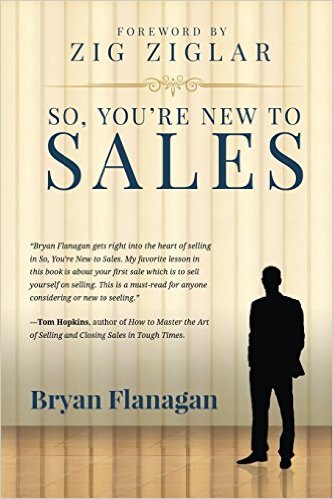INSIDER: So, You're New to Sales
Austin Taylor, MBA Candidate
 Every day, new real estate agents begin their journey to career success. While most have undergone some classroom training to receive their license, only a few have received excellent, practical advice about how to successfully begin and sustain their careers in real estate.
Every day, new real estate agents begin their journey to career success. While most have undergone some classroom training to receive their license, only a few have received excellent, practical advice about how to successfully begin and sustain their careers in real estate.
In his book So, You're New to Sales, Bryan Flanagan lays out every detail, step-by-step, that is necessary for the novice to become a professional agent. Specifically, Flanagan draws from his years of sales experience to inform the reader of the correct mental mindset for success, emphasizing the importance of forming relationships with prospects that are founded on trust. So, You're New to Sales encourages all new sales professionals to reach their fullest potential by taking pride in the higher calling of sales and through continuous development of your sales skills.
THINK POINT #1: Respect Your Profession - Sell Yourself about Selling,
Before you can effectively launch your career, you must first sell yourself about selling. That is, you must have the proper motivation and desire to succeed. To do so, you must first make one foundational revelation about the act of selling homes.
Real estate is a helping profession.
While this may seem obvious, it is pivotal that agent understand they exist solely to aid their clients. In the mind of the professional agent, sales is not about the agent, but instead focus is placed solely on the needs of others. Flanagan repeatedly emphasizes this point by stating, "Sales is not about you."
Once you are able to take great pride in the work you perform for others, you are ready to respect your profession. Residential real estate is an honorable profession in which you help the client find an emotional home for his/her future. Simultaneously, most clients are selecting their largest personal financial investment. The work you perform on the client’s behalf will bestow the long-term benefit of a place to call home, while you receive a commission that offers you short-term financial support. The client should always be the clear winner.
For success in your career, you would do well to respect your profession, and never be ashamed of the work you do. After all, real estate truly is a helping profession.
THINK POINT #2: Learn Your Profession - Never Stop Absorbing Information
Having cleared the first hurdle by finding the proper motivation and will to succeed, next you should apply your will by learning the skills necessary for selling success. Once you begin learning, you will never graduate…developing as a professional agent is a life-long process.
Develop your skills by absorbing knowledge about your profession. You should continuously study, read, listen, observe, and ask questions. Learn about the real estate industry, learn about your local housing market, learn about common home characteristics, and learn the art of selling. Be informed and acquire a great breadth of knowledge, so that you will be better suited to help the client make informed decisions.
Confidence comes from competence. As famous sales guru Zig Ziglar once said, "You cannot consistently perform in a manner that is inconsistent with the way you see yourself." If you view yourself as only a rookie agent or as unsuccessful at this point in your career, it will be difficult to perform at the high level you desire. If you are struggling with your confidence, then get serious about investing the necessary time to learn your profession. Once you achieve an expert level of knowledge in the industry, your confidence will undoubtedly soar with your newfound competence.
Flanagan encourages those who become disenchanted with the learning process to learn the following phrase: If it is to be, it is up to me. Set your goals before you, and find the will to do everything necessary to achieve those goals. If you desire to sell 40 houses in one year (undoubtedly due to your unselfish desire to help 40 families), your work ethic will be the key determination of whether you achieve such a lofty goal. You may not be able to affect the market or the decision-making process of your clients, but you are fully in control of your personal effort.
THINK POINT #3 – Sell the Value
Successful real estate agents sell the value of the home to the client, not just the features. When selling a home, it is essential to understand that you are not simply selling the location and characteristics of a house. Rather, you are meeting the foundational needs of the client. People buy what the product will do for them, not the features. For example, a client comes to you and says s/he needs a beautiful and grand home in which to raise a family. You would not sell the home by listing the features as follows: a two-story colonial with 4 bedrooms, hardwood floors, and great curb appeal for $250,000. Instead, you should sell the value of the home by indicating the unique benefits that meet the client’s needs of the perfect place to raise a family. After establishing why the home has value to the client and peaking the client’s interest, you would then explain the features and price. Once you have communicated the benefit, the client will be better able to interpret the features as adequate, or the price as acceptable or too high.
To convince the client a home has value, you must first be convinced of the benefits yourself. When selling in any industry, you must learn and believe in the benefits of the product. In application to real estate, the agent should be fully informed about every home you are showing. Aware of the needs and wants of the client, you should personally believe the home’s benefits provide value to your client.
Selling is something you do with the client, not to the client. Be aware that each potential home buyer has a different set of needs and values in a home. A successful agent becomes aware of the needs and values of the client by a simple process of asking and listening. Be sure to ask valuable and detailed questions. Avoid yes and no questions, and seek to find the reasoning behind the client’s stated preferences. With a greater understanding of what the client values, a successful agent will sell the value, and not the features of the home. Selling a home that provides great value to the client will lead to great customer satisfaction, rather than simply satisfying a checklist of features.
THINK POINT #4 – Build Trust 
Developing trust between yourself and the client can be a painstaking and tedious process that takes an extended period of time. Sadly, the trust you are able to establish can be lost in an instant. Maintain and build trust by holding yourself to the highest standards of ethics, professionalism, and always prioritizing the needs of the client.
As discussed earlier, real estate is a helping profession and accordingly the client’s needs must come first. Unethical behavior can be avoided by simply remembering to place the client’s needs before your own. If it is apparent that you place the client’s needs first, s/he will perceive your high ethical standards, and trust will begin to develop. The instant the client feels that you are not acting in his/her best interest, the client may perceive you as unethical and all semblance of trust will vanish.
As a successful real estate agent, you can be less than perfect, but you can never afford to be less than professional. Demonstrate your professionalism by taking the attention off of you and placing it fully on the client. As the agent, you should know more about the prospect’s needs, profession, and personal life than the prospect knows about your own.
The most successful agents build trust by proving their effectiveness to the client. After all, the client only demands your service to be effective, not perfect. Rather than stress over perfection and portraying a fake personality, simply be authentic and genuine. If the client thinks you are fake, she/he will be disinclined to trust you -- your personality, your honesty, and ultimately your competence as an agent.
Ultimately, the goal of establishing trust is to build a relationship. Once a strong relationship is established, the client will continually return to you for all of his/her real estate needs. Furthermore, establishing a great relationship with one client increases the likelihood that the client will refer you to other potential home buyers in the community.
THINK POINT #5 – Prospecting
We have discussed how real estate must be viewed as a helping profession, but one glaring question remains. How do you find clients, and then convince them to select you as their agent? This process is known as prospecting.
The new agent must develop a list of prospects. To gather a list of potential home buyers, you must generate the leads yourself. Prospecting is a tedious yet vital task to your profession, and it is vital to your success that you maintain the proper attitude. It is important to develop a system of producing prospects. If your list of prospects is small, be careful to not place too much pressure on your list, or else the relationships may be damaged. If your prospecting system is not effective, simply alter your system and maintain a positive attitude.
Flanagan emphasizes that while you are not always selling a home, you should always be prospecting. If you only remember one thing about prospecting, remember this: Contacts lead to contracts. Find a method of contacting new prospects that works for you and implement it daily.
To find a qualified home buyer that will hire you to be his/her agent and ultimately close the deal, apply the four P’s listed below.
- Prospect Filter: Identify and target qualified decision makers. If the prospect has no decision-making power or no financial ability to purchase a home, then s/he should be placed at the bottom of your list.
- Product Filter: Can a home be found that provides the value the client desires? If such a home is simply not available on the market, a sale is unlikely to occur.
- Process Filter: Follow a prospect-centered approach to uncover the essential needs of a prospect. Generate understanding of the client’s true desires.
- Person Filter: If you simply are not the right salesperson, then a sale will not take place. Prospects buy the product and the sales professional, or in this case, the home and the agent. For this reason, it is important to build a relationship with the client founded on trust.
. . . . . . . . . . . . . . . . . . .
Recommended Reading
Flanagan, Bryan (2016), So, You’re New to Sales, Washington: Made for Success Publishing.
. . . . . . . . . . . . . . . . . . .
About the Author
Austin Taylor, MBA Candidate
Baylor University
Austin Taylor is a graduate student from Austin, Texas. Austin is currently seeking an MBA degree with a specialization in Healthcare Administration and plans to work in the healthcare industry. He earned a Bachelor of Arts degree in International Studies with a focus in Politics and Diplomacy from Texas A&M University in 2014. Before beginning graduate school, Austin interned for a Federal Magistrate Judge in the Eastern District of Texas. In his free time, Austin enjoys spending time with his wife Jessica, and volunteering in the community.